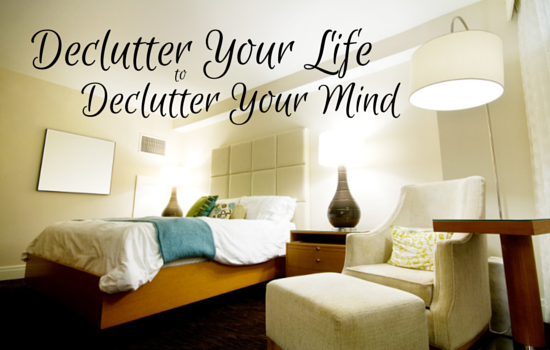Have you ever tried to work on a project at home while the house was a mess? Or tried to clean up and found yourself so overwhelmed that you quit altogether? I usually say “messy bed, messy head!” This implies that for as long as your environment, like your bedroom, is messy, your mind will be as well.
These frustrations are natural and result from the stress of working in cluttered spaces. Clutter reduces our ability to focus and process information because it is extremely distracting, not to mention the cause of emotional irritability!
Decluttering your home or workspace can tremendously reduce stress and increase focus. And while the thought of cleaning up the ever-mounting tidal wave of junk can be intimidating, we are here to help.
We have listed tips to help you conquer the heaps of unnecessary belongings and obligations that overwhelm your daily life. That’s right, decluttering pertains to your schedule as well. Being stretched too thin causes just as much stress as having a messy house. Creating more space in your daily calendar will reduce the number of things your brain is constantly occupied with and leave you feeling free and refreshed.
Start Slow
Taking on any large project all at once is sure to burn you out. Take only a few minutes out of each day to work on the declutter process.
In 10 minutes organize as much of your cluttered spaces as you can. Sort the scattered papers on your desk. Pick up the clothes in the bedroom. Put away the toys from the kids and the pets. After 10 minutes stop.
Pick up where you left off the next day. Pull everything out of drawers and closets and sort it into piles as you go. Determine what gets used regularly, and what can be parted with. Donate or sell anything that probably won’t be missed. Everyone has shoes and clothes that never get worn, they are just taking up space. Let them go.
Down-load
In modern times, much of our clutter is digital. Outdated contact lists, flooded email inboxes, hundreds of icons on our computer desktops. All of these things slow us and our electronics down. Make a point of clearing out unused information regularly.
Set a day each week to clear out unused programs, downloads and media. This will keep the number of emails or icons from ever becoming too overwhelming.
If information is part of your career or hobby, try saving it to an external hard drive and labeling it. Then store your drives in a single location for easy reference later.
Say “No”
Your time is precious, and the more you give away to others the less you have for your own needs. Most of us like to be kind and helpful, but at a certain point helping others means harming yourself. You need time to unwind and enjoy the things that bring you happiness, and you can’t do this if you say “yes” to every single request.
There are plenty of ways to say “no” without being rude. Simply apologize and explain that your schedule is tight, but that you might be able to help another time. Remember that you don’t owe most people anything, and that they are asking, not telling you to help. They will likely be just fine whether you help them or someone else does.
Let Go
Our mind often feels cluttered because we are clinging to so many thoughts and concerns about the future and past. But those things aren’t real in the present, and worrying about them only takes up space that could be used to solve problems and enjoy things right now. Write down your future needs, and then let them go.
This is the practice of mindfulness. Clearing your mind of worry can even be an important first step in decluttering your physical space and your day. The less stress you carry into a project, the more calmly you will be able to complete it.
Relaxation is the key to, and the goal of decluttering. It is a benevolent cycle that, when done patiently and consistently, will lead to more free time and a more organized life. Try committing to it with friends, and hold each other to your goals, just like working out at the gym with a partner. This is a great practice to get into with significant others and families.
Be truthful in your assessment of what you really need, and remember to create designated spaces for the things you do decide to keep. Always put them back after each use. After a couple of weeks, you will start to notice that as the clutter decreases, your focus improves, and so does your mood.
Are you ready to incorporate more healthy habits in your life? Follow Loving Life Therapy on Twitter so you don’t miss the next installment in our series on Loving Your Life!


 Eat More Snacks: 21 Healthy Snacks Under 200 Calories
Eat More Snacks: 21 Healthy Snacks Under 200 Calories